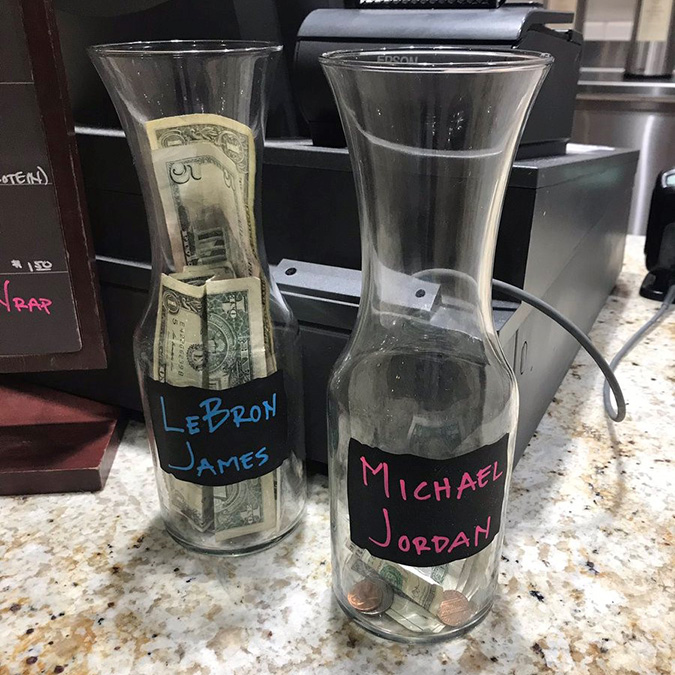Can your preference for cats or dogs be leveraged to help others? In recently published research, my co-authors and I explore a strategy we call “dueling preferences”, which can be observed in cafés, in charity drives, and on the street. The dueling preferences approach frames the act of giving as a choice between two options and, according to our findings, it can be more effective at raising money than traditional appeals. We find that this approach works because it gives people a chance to say something about who they are—an opportunity most of us are willing to pay for.
Many people and organizations—ranging from café baristas, to charities, to other front-line customer service and retail workers—rely on customer gifts like tips and donations to survive. As a result, people are always trying to come up with creative solutions to encourage giving and raise money.
You might have noticed a new kind of giving appeal in cafés or charity drives, where the opportunity to give is framed as a “duel” between two options, and a potential giver can express their personal preference via their gift. In cafés, for example, side-by-side tip jars may ask whether patrons prefer LeBron James or Michael Jordan, and patrons indicate their preference by dropping cash in the appropriate jar. Similarly, the company BallotBin designs custom receptacles that ask smokers a question, like whether hamburgers or pizza is their favorite food, allowing them to express their preference by disposing of their cigarette butts in one of two labeled compartments (https://ballotbin.co.uk/).
Is this “dueling preferences” strategy simply eye-catching, or does it actually motivate more people to engage in prosocial behavior? And if it can be effective, why?
Our findings
In our recent article in the Journal of Marketing, I, along my co-first author Katherine Du (Assistant Professor at University of Wisconsin-Milwaukee) and Jonah Berger (Associate Professor at University of Pennsylvania), sought out to answer these questions. First, we placed a cats-versus-dogs duel in a café in Durham, North Carolina, and we secretly recorded when and how much people tipped. We discovered that the duel was indeed more effective than the café’s traditional tip jar—it more than doubled the baristas’ tips compared to a typical day. We also found that implementing a chocolate versus vanilla duel increased donations to the American Red Cross by 28% percent, compared to a standard donation ask.
Next, we sought to understand why this approach works. Several follow-up studies revealed that this approach works because it provides people with the opportunity to say something about who they are. People love to share their opinions—in fact, the parts of the brain that light up when we share our opinions also light up in response to finding $10 or getting a sweet treat. Put simply, sharing what we believe in is so rewarding that people are willing to give money to do it. This inherent drive to share our preferences is what makes the dueling approach so effective at increasing prosocial giving.
Because the dueling preferences strategy is powered by people’s drive to express themselves, it is most effective at raising money when the duel captures issues that most people are opinionated about, such as summer versus winter, mountains versus beach, or chocolate versus vanilla ice cream. Indeed, when we tested a duel that asked people’s preferences for the letter “A” vs. “B”—a relatively uninspiring issue—this did not increase giving. The dueling preferences approach is also more likely to work among people who particularly love to express themselves. While some people like to keep their opinions closer to their vests, many love to share their thoughts to anyone who will listen. Our studies showed that the dueling preferences approach is especially effective among the latter.
Putting it all together
Overall, our research suggests that those interested in increasing prosocial giving, including customer service workers and managers of small businesses and charities, can benefit by leveraging this simple and flexible approach, and in turn, aid the people and communities on the receiving end of these crucial gifts.
Moving forward, perhaps this approach could be applied to encourage additional prosocial behaviors beyond just tipping and donating. For instance, while public health experts have extolled the importance of protecting others by wearing masks, many local and federal agencies have struggled to get people on board. Perhaps by offering citizens the choice between various expressive masks, like offering MU or KU masks in Kansas City, these agencies may increase adoption and help mitigate the spread of the coronavirus. Ultimately, the magic of dueling preferences lies in its ability to leverage any valued preferences—whether that is a Star Trek fan, chocaholic, or lefty—to increase prosocial behavior.

